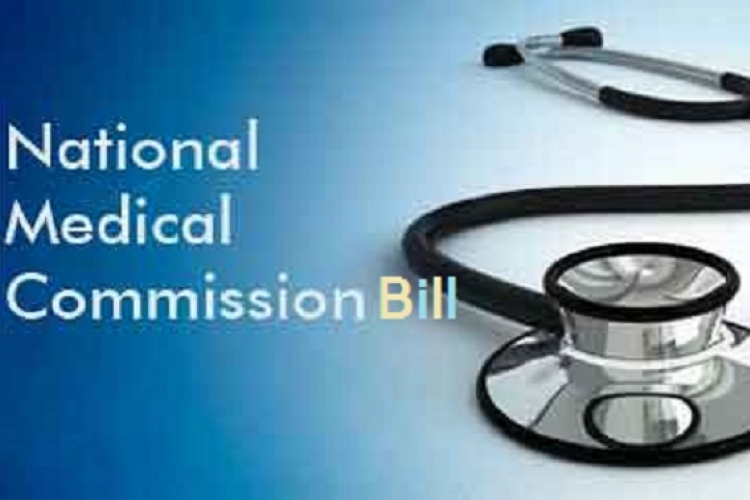The National Medical Commission Bill
The National Medical Commission Bill
The National Medical Commission (NMC) Bill was passed by both houses of parliament this week. The NMC is set to replace the Medical Council of India (MCI), the regulator for medical education in the country, which once earned the infamous epithet of ‘den of corruption’ by the Delhi high court.
Features and changes proposed by NMC Bill for Medical Education
1. The biggest change proposed by NMC Bill is the introduction of one uniform ‘exit’ examination for all undergraduate medical students called NEXT.The national level examination would be
-
.A licentiate examination which would confer the MBBS degree to the students and give them the necessary license to practice modern medicine
-
Would be used as an entrance examination for PG or postgraduate courses. The same examination would be used for admissions across all medical institutes, including Institutes of National Importance like AIIMS, PGI Chandigarh and JIPMER with a common counselling process for all postgraduate seats.
-
Be a licentiate exam for foreign graduates who wish to practice in the country after acquiring medical education from abroad
2. NEET PG would be scrapped and NEXT would be used for the same. Clarifying the provisions of NMC, confirmed that there would be no cap on the number of attempts for NEXT Examination.
3. The undergraduate admission process would remain more or less the same under NMC with no changes proposed for NEET examinations.
4. On the matter CHPs or Community Health Providers, the bill would lay down the process of selecting CHPs. A provision has been made in the NMC Act to register some Community Health Providers (CHPs) who shall be modern medicine professionals; they shall not be dealing with any alternative system of medicine. Also, they will have limited powers for providing primary and preventive healthcare at the mid-level.
5. Qualifications for CHPs would be decided and regulated by the eminent doctors of NMC. Only those candidates who meet the conditions (which would be decided by public debate and expert suggestions) would be able to practice as CHPs.
6. The extent of medical education, as well as the level to which CHPs can offer to advise, would be limited by the NMC. Also, CHPs would have to have a basic understanding of modern medicine and would not be dealing with an alternative system of medicine.
7. The other change that NMC Act would bring is the reduction of fees. NMC provides for the regulation of fees and all other charges in 50 per cent seats in private colleges as well as deemed to be Universities in the country. This is expected to considerably bring down the cost of medical education in the country.
8.NMC also promises probity in medical education, simplification of procedures and enhancement of the number of medical seats in the country – which is required.
NMC would consist of a total of 33 members. Of these, 10 will be Vice-Chancellors of State Health Universities and 9 would be elected members of State Medical Councils. Remaining would be appointed by the Central Government.
Opinion:
The most contentious provision of the Act, opposed by the Indian Medical Association (IMA), deals with community health providers (CHP). The government proposes to deploy 250,000 CHPs, following a proper registration process, in remote villages to treat patients. Protesting doctors alleged the government is practically authorizing quacks to play with the life of unsuspecting patients.
Any licensing exam to ensure the quality of MBBS graduates should check for knowledge, skills to treat non-complicated commonly encountered disease conditions and an attitude of empathy and propriety. It is very hard to comprehend how the NMC intends to make the final year MBBS exam uniform across scores of universities and hundreds of medical colleges in this vast country. Apart from that, the utility of an exam that tests only a few of the many MBBS subjects, and has a practical component which may have inherent bias built-in, is questionable. What will happen to someone who fails to secure a postgraduate seat and wishes to take the exam again is another huge concern in this vast country.
While the intent of allowing Indian students who have completed an MBBS abroad to add to the healthcare workforce is welcome, NEXT being a licensing exam for them does not add up. The concept of an exit exam to ensure minimum standard quality of a doctor is laudable and finds wide acceptance. But with all the stakes not taken into consideration, the NMC should call for an expert consultation, learn from successful examples like the United States Medical Licensing Examination and create test architectures while taking all states into concurrence. This would facilitate the realisation of the goal of a multipurpose exit exam.


 IAS -2025 Prelims Combined Mains Batch - III Starts - 14-04-2024
IAS -2025 Prelims Combined Mains Batch - III Starts - 14-04-2024